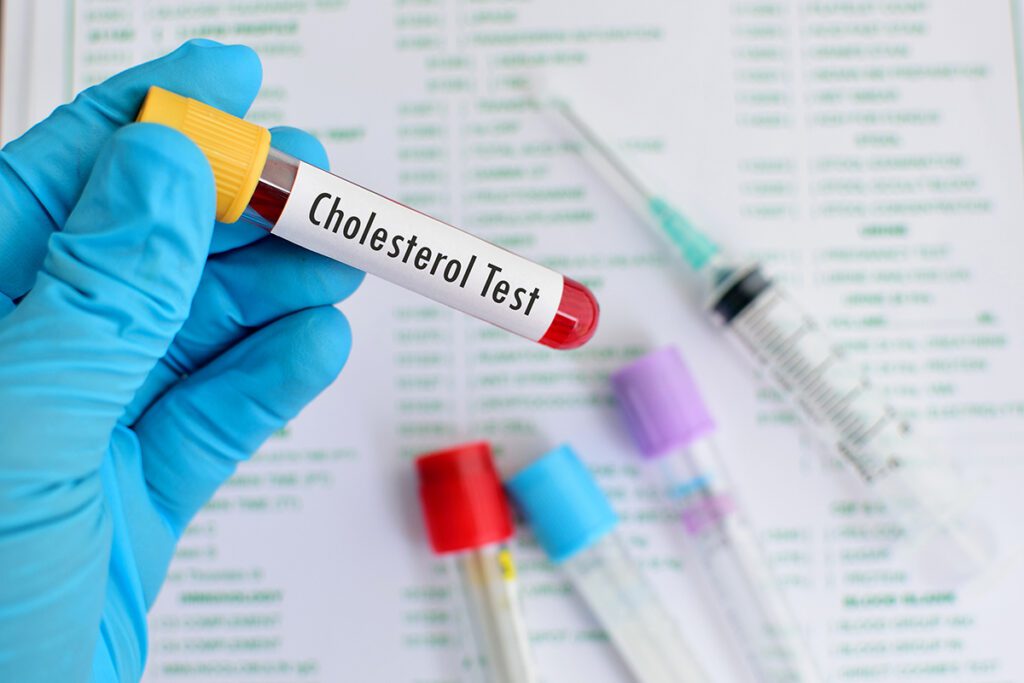September is National Cholesterol Education Month, so it’s the perfect time to educate yourself about the dangers of high cholesterol and the best options for managing your cholesterol. High cholesterol runs rampant in the U.S., and it’s linked with many of the country’s leading causes of death. Take our quiz to learn about high cholesterol and ways to protect yourself from this dangerous condition.
1.) True or false? High cholesterol has no signs or symptoms, so the only way to know if you have it is to get your cholesterol checked.
2.) How many adults in America are estimated to have high cholesterol?
- Just under 1 in 15 adults
- About 1 in 10 adults
- Approximately 1 in 5 adults
- Nearly 1 in 3 adults
3.) True or false? Blood cholesterol is a waxy, fatlike substance made by your liver, and it is essential for good health. Your body makes all the cholesterol it needs, so most issues with unhealthy levels of blood cholesterol come from the cholesterol in unhealthy foods.
4.) Having high cholesterol puts you at risk for what deadly health condition?
- Heart disease
- Stroke
- Aortic aneurysm
- All of the above
5.) True or false? There are two types of cholesterol: HDL (high-density lipoprotein), or “good” cholesterol, which absorbs cholesterol and carries it back to the liver where it is eliminated from the body; and LDL (low-density lipoprotein), or “bad” cholesterol, which can build up on the walls of your blood vessels, narrowing them and blocking blood flow.
6.) Which of the following are risk factors for high cholesterol that you can control?
- Obesity and Type 2 diabetes
- Eating a diet high in saturated fats and trans fats
- Not getting enough physical activity
- Smoking
- All of the above
7.) Which of the following is a risk factor for high cholesterol that you can control?
- Family history of high cholesterol and/or an inherited genetic condition called familial hypercholesterolemia (FH)
- Age. As we age, our bodies can’t clear cholesterol from the blood as well
- Alcohol consumption
- Age. Until age 55, women tend to have lower “bad” cholesterol than men, and men at every age tend to have lower “good” cholesterol than women.
8.) Which of the following are actions you can take to lower “bad” cholesterol and raise “good” cholesterol?
- Eat a healthy diet. Limit foods high in saturated fat (cheese, fatty meats, dairy desserts, and tropical oils), and eat foods that are low in saturated fat, trans fat, sodium (salt), and added sugars and high in fiber (lean meats, seafood, fat-free or low-fat dairy products, whole grains, fruits, vegetables, beans, vegetable oils, nuts)
- Maintain a healthy weight and get enough physical activity
- Quit smoking
- Limit alcohol consumption to one alcoholic drink per day for women and two alcoholic drinks per day for men.
- All of the above
9.) True or false? There are cholesterol-lowering medications your doctor might prescribe in addition to lifestyle changes to treat high cholesterol.
compiled by ERIKA ALDRICH / information provided by THE CENTERS FOR DISEASE CONTROL AND PREVENTION (CDC)
ANSWERS:
- True. There are no signs or symptoms of high cholesterol.
- D. Nearly 1 in 3 adults. Almost 33% of adult Americans have high cholesterol.
- True. Most adults have high cholesterol from eating unhealthy foods and having other unhealthy habits.
- D. All of the above. High cholesterol is a risk factor for heart disease, stroke, and more.
- True. LDL, or “bad” cholesterol, increases your blood cholesterol levels while HDL, or “good” cholesterol, lowers it.
- E. All of the above. Many unhealthy habits can increase your risk for high cholesterol.
- C. Alcohol consumption. All the rest—family history, age, and gender—are risk factors for high cholesterol that you cannot control.
- E. All of the above. Most of the risk factors for high cholesterol are within your control, such as diet, exercise, and smoking.
- True. There are numerous cholesterol-lowering medications, but your doctor will likely order lifestyle changes as well to lower high cholesterol.
